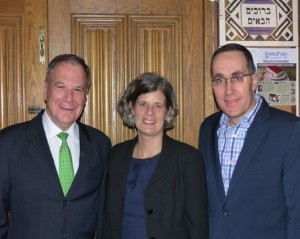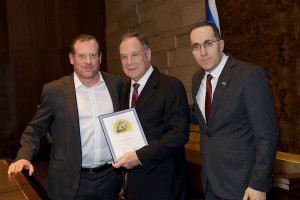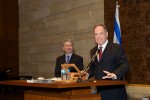Dan Gillerman addresses the audience at Jewish National Fund Pacific Region’s Tu b’Shevat event Feb. 3 as emcee Geoffrey Druker looks on. (photo by Robert Albanese)
A former Israeli ambassador to the United Nations heaped praise on Canada and excoriated the United States during a candid speech here last week.

Dan Gillerman, who led the Israeli delegation at the UN from 2003 to 2008, was filling in for current Ambassador Ron Prosor, whose obligations kept him in New York. The occasion was the Jewish National Fund of Canada’s Tu b’Shevat event at Beth Israel on Feb. 3. He also spoke in Victoria at Emanu-El for JNF the next day.
Gillerman, who acknowledges that he has a penchant for political incorrectness and is now a private citizen free to speak his mind without the constraints of a diplomatic post, received a strong ovation when he called Canada “by far, the greatest friend Israel has in the world” and when he heaped praise on Canada’s Prime Minister Stephen Harper as “probably the greatest leader in the world.”
His perspective on the United States was not nearly as positive.
“I think that what we are witnessing today is at least a perception, hopefully a wrong perception, of a weak America and a weak American president,” Gillerman said. Even a whiff of American weakness is a dangerous thing in the world, he said, with America’s enemies feeling that they can get away with murder and America’s allies believing that they cannot rely on the superpower.
Gillerman equates the contemporary situation of the United States with the advent of the First World War a century ago, which he says was due in part to perceptions of British weakness under Prime Minister H.H. Asquith. Gillerman contended that Russian dictator Vladimir Putin would not do what he did in Ukraine and other countries would not do what they are doing elsewhere if they thought the United States would intervene.
On dangers facing Israel, Gillerman said that the most serious threats are not Hamas or Hezbollah, and not even Iran, which is pushing for nuclear capability. “They are not our most dangerous threats, because we can take care of them,” he said. “The two most dangerous phenomena we face today are appeasement and being politically correct.”
Trying to appease terror and the Iranian regime, as the world is doing today, Gillerman said, is very dangerous.
About political correctness, he said the world is “trying to find other words to explain what is happening,” other than identifying it as Islamic extremism and terrorism. “We have to call a spade a spade,” he said. “There is evil in this world. There is terror in this world. It threatens your country and every country in the world.”
On Iran, Gillerman characterized nuclear negotiations as “a weak America and a weak American president who wants an agreement at any cost.”
Gillerman said he had a conversation with UN Secretary-General Ban Ki-Moon, who is South Korean. Gillerman said that the global powers dithered while North Korea prepared for nuclear weaponry then one day the world woke up to a nuclear North Korea. Gillerman said Ban told him that Iran is much more dangerous than North Korea.
“North Korea sought nuclear weapons out of desperation,” Gillerman quoted Ban as telling him. “While Iran is seeking them out of aspiration.”
Gillerman spoke of his close relationship with the late former Israeli prime minister Ariel Sharon, who appointed him ambassador to the UN. Gillerman’s background is not in politics or diplomacy, but business, and he was chairman of the Israeli Chamber of Commerce before his ambassadorial appointment.
He said Sharon warned him that the appointment to the UN would leave him lonely and facing hostility, but Gillerman said he later told the prime minister that he had been wrong. As Israel’s representative at the world body, Gillerman said, he operated on the knowledge that he represented a country that “is far, far better than most other member countries of the United Nations.”
Despite Israel’s isolation at the UN, one of Gillerman’s achievements during his time as ambassador was the proclamation of International Holocaust Remembrance Day every January. It was the first time that an Israeli-sponsored resolution was passed by the General Assembly.
Gillerman was speaking on the day that Canadian foreign minister John Baird announced his resignation from cabinet and politics. Gillerman said that he had spent several days with Baird recently in Davos, Switzerland, and had no indication that Baird was planning a major change.
“I think it’s a loss for Canada and a loss for Israel, but I wish him well,” Gillerman said, before once again praising Canada’s leaders.
“I think you have in Stephen Harper one of the greatest leaders in the world. Probably the greatest leader in the world and definitely the best friend Israel has in the world,” he said.
While the bulk of the former ambassador’s speech was ominous and pessimistic, it didn’t conclude that way.
“Despite all that, I am optimistic about the future of Israel,” he said near the end of his remarks. “I believe that the world is waking up.”
In the Arab world, he said, the fight between extremists and moderates will lead moderates to recognize that Israel is not the enemy. Comparatively moderate Arab states are as afraid of Iranian extremism and nuclear capability as Israel is – possibly more afraid – he said, and a regional agreement will emerge from shared interests.
“I believe we can reach a fair and lasting settlement with the Palestinians,” he said, adding that leadership is needed on both sides, and in the world, and that it must go beyond bilateralism. He predicted what he calls a “23-state solution,” an agreement between Israel and Arab countries that leads to lasting peace.
He went on to say that if the Palestinian issue were settled, Arab states could calm their streets and become partners with Israel.
To those who say that the United Nations is a failed, useless organization, Gillerman described it as simply a building on First Avenue in Manhattan that is only as good as its tenants. Blaming the UN for the faults of its member-states is like blaming Madison Square Garden when the Knicks lose, he said. “It’s not the UN as an organization, it’s the world we live in.” The UN General Assembly has a “built-in immoral majority,” he said.

Prosor, the ambassador who was originally slated to attend, provided a video message that was screened at the beginning of the event. Singers from Vancouver Talmud Torah sang a song for Tu b’Shevat and King David High School students sang the national anthems. The event was emceed by Geoffrey Druker, Rabbi Jonathan Infeld welcomed visitors to the new Beth Israel building and Diane Switzer, board chair of the Jewish Federation of Greater Vancouver, introduced Gillerman. Frank Sirlin, president of JNF Canada Pacific Region, spoke about this year’s Tu b’Shevat campaign, which will see trees planted along roads in Israel that are within range of gunfire from the Gaza Strip. The “green barrier” will help green the desert while shielding drivers and passengers from sniper fire. The JNF campaign includes two telethon sessions, on Feb. 15 and 22.
Pat Johnson is a Vancouver writer and principal in PRsuasiveMedia.com.

